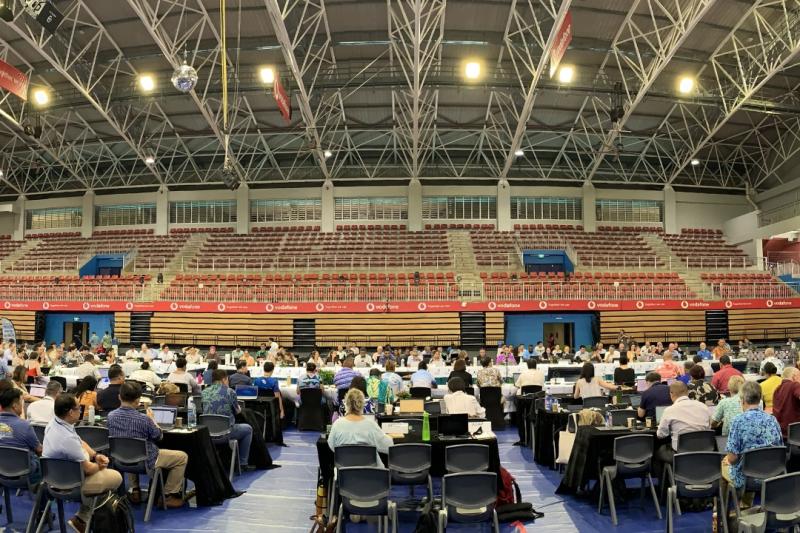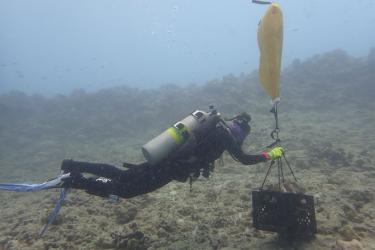The United States led efforts to address climate change and ensure continued stability for North Pacific striped marlin at this year’s annual Western and Central Pacific Fisheries Commission meeting. Our efforts also helped establish the first-ever set of binding crew labor standards adopted in an international regional fisheries management organization.
Held in Fiji, the meeting brought together 26 members, including the United States and participating territories. Members are involved in the management of fisheries for highly migratory fish stocks in the Western and Central Pacific Ocean. The Commission is responsible for management of the world’s largest tuna fisheries. Management decisions are based on the best available science. Members strive for consensus decision-making, while using compliance processes to promote accountability in their implementation.
Climate Change
Climate change is causing significant impacts to our ocean, affecting communities whose economies and food security rely on well-managed, sustainable fisheries. Fishermen have witnessed firsthand these ocean changes and are among the most vulnerable to a changing climate. The United States has worked with other members to lead and advance the Commission’s work to develop strategies for addressing climate change over the past several years.
Together with the Marshall Islands, the United States led the process to develop a climate change workplan for the Commission. The plan will be jointly funded by the United States and Taiwan. The adopted workplan provides a framework for Pacific tuna fisheries to be managed in a proactive manner. It accounts for the risks and uncertainties associated with climate change impacts on the Pacific Ocean.
Exiting the negotiations, NOAA Deputy Assistant Secretary for International Fisheries, Dr. Kelly Kryc, highlighted the Commission’s success in taking steps to address climate change in Pacific fisheries. “Working together with our Pacific Islands partners, the United States charted new territory with the adoption of a climate change work plan that supports an assessment of the climate risks to its work. These actions create a foundation for resilience and opportunity amidst climate uncertainty,” said Kryc, who co-led the climate change workplan.
New Approach to Long-Term Conservation Challenge: Rebuilding North Pacific Striped Marlin
The United States led the effort to adopt a rebuilding plan to promote the long-term sustainable management of North Pacific striped marlin. Stock assessments for the past decade have shown this stock to be both overfished and experiencing overfishing. In 2019, the Commission agreed to develop a rebuilding plan for this species, but failed to do so until this year. The measure adopted by the Commission this year lowers the total allowable catch for the stock ensuring that the rebuilding process can start.
Dr. Kryc reflected on the outcomes and noted, “This measure was a long time coming. It’s a win for the North Pacific striped marlin. Hopefully our actions here at the Commission this year will help turn the tide for this species and help it on its road to recovery.”
Crew Labor Standards
The United States has prioritized action to address concerns about labor abuses and improve crew labor standards in international fisheries. This includes leading the adoption of resolutions on labor standards across five regional fisheries management organizations. After nearly 4 years of work co-chaired by New Zealand and Indonesia, the Commission adopted the first-ever binding conservation and management measure on crew labor standards. The new labor standards measure requires the owners and operators of fishing vessels in the Convention area to meet certain standards for working conditions. They must also take specific steps in the event a crew member is missing, falls overboard, is mistreated, or dies.
"The United States is extremely pleased with the adoption of the first binding measure at a regional fisheries management organization to protect crew members. This groundbreaking step paves the way for greater global protection of crew members aboard fishing vessels around the world," said Alexa Cole, Director for NOAA Fisheries Office of International Affairs, Trade, and Commerce.
Preventing the Take of Cetaceans by Longline Fisheries
The United States and South Korea led efforts to protect cetaceans at the meeting. As a result of this measure being adopted, both purse seine and longline vessels are prohibited from harvesting, retaining, or transhipping cetaceans in the Convention Area. This closes a loophole and strengthens protections for cetaceans in the Western Central Pacific Ocean.
South Pacific Albacore
South Pacific albacore tuna is one of the most important species for American Samoa and its neighbors in the South Pacific. It is a key economic driver and staple for the region’s food security. The United States, alongside the U.S. territory of American Samoa, pressed for the Commission to adopt key elements of the proposed south Pacific albacore harvest strategy. Without consensus on the details of the harvest strategy, the Commission committed to holding several workshops and intersessional meetings. The aim is to adopt the South Pacific albacore harvest strategy in 2025. To ensure this work proceeds apace and considers the full extent of the stock across the Pacific, the United States will lead international cooperation between the Commission and the Inter-American Tropical Tuna Commission on south Pacific albacore in 2025. IATTC is responsible for managing tuna fisheries in the eastern Pacific. This international cooperation will be modeled after the successful joint work between the Commission and IATTC on rebuilding the Pacific bluefin stock over the past decade.
Seabirds
Over the past 2 years, the United States worked with other members of the Commission to improve bycatch mitigation measures for seabirds in the Pacific. Led by New Zealand, this year’s work aimed to better align the Commission’s seabird conservation and management measure with best practices developed by the Agreement on the Conservation of Albatross and Petrels. The United States will continue working with New Zealand to improve the Commission’s seabird bycatch mitigation measure in the future.



